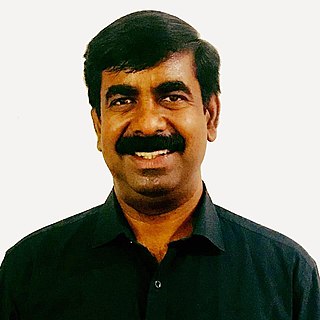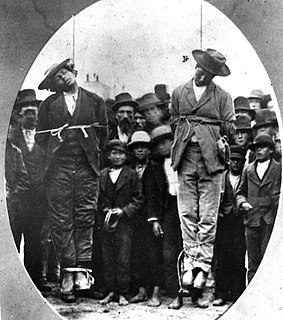Related Research Articles

William Edward Burghardt Du Bois was an American sociologist, socialist, historian, and Pan-Africanist civil rights activist. Born in Great Barrington, Massachusetts, Du Bois grew up in a relatively tolerant and integrated community, and after completing graduate work at the University of Berlin and Harvard University, where he was the first African American to earn a doctorate, he became a professor of history, sociology, and economics at Atlanta University. Du Bois was one of the founders of the National Association for the Advancement of Colored People (NAACP) in 1909.
Gary LaFree is a Professor and Chair of the Criminology and Criminal Justice department at the University of Maryland, College Park, the Director of the Maryland Crime Research and Innovation Center (MCRIC) and the Founding Director of the National Consortium for the Study of Terrorism and Responses to Terrorism (START). His main areas of expertise are sociology, criminology, race and crime, cross-national comparative research and political violence and terrorism.
In the United States, the relationship between race and crime has been a topic of public controversy and scholarly debate for more than a century. Crime rates vary significantly between racial groups. Academic research indicates that the over-representation of some racial minorities in the criminal justice system can in part be explained by socioeconomic factors, such as poverty, exposure to poor neighborhoods, poor access to public and early education, and exposure to harmful chemicals and pollution. Racial housing segregation has also been linked to racial disparities in crime rates, as Blacks have historically and to the present been prevented from moving into prosperous low-crime areas through actions of the government and private actors. Various explanations within criminology have been proposed for racial disparities in crime rates, including conflict theory, strain theory, general strain theory, social disorganization theory, macrostructural opportunity theory, social control theory, and subcultural theory.

Marxist criminology is one of the schools of criminology. It parallels the work of the structural functionalism school which focuses on what produces stability and continuity in society but, unlike the functionalists, it adopts a predefined political philosophy. As in conflict criminology, it focuses on why things change, identifying the disruptive forces in industrialized societies, and describing how society is divided by power, wealth, prestige, and the perceptions of the world. "The shape and character of the legal system in complex societies can be understood as deriving from the conflicts inherent in the structure of these societies which are stratified economically and politically". It is concerned with the causal relationships between society and crime, i.e. to establish a critical understanding of how the immediate and structural social environment gives rise to crime and criminogenic conditions.

Left realism emerged in criminology from critical criminology as a reaction against what was perceived to be the left's failure to take a practical interest in everyday crime, allowing right realism to monopolize the political agenda on law and order. Left realism argues that crime disproportionately affects working-class people, but that solutions that only increase repression serve to make the crime problem worse. Instead they argue that the root causes of crime lie in relative deprivation, although preventive measures and policing are necessary, but these should be democratically controlled.
John Lea is a British left realist criminologist. For many years he was based at the Centre for Criminology and the Crime and Conflict Research Centre, Middlesex University in the United Kingdom.
Jock Young was a British sociologist and an influential criminologist.
Roger Matthews, was a British criminologist. He was a Professor of Criminology at the University of Kent, Canterbury, United Kingdom. Prior to joining the University of Kent, he was a professor of criminology at London South Bank University and Middlesex University.
The French Penal Code of 1791 was a penal code adopted during the French Revolution by the Constituent Assembly, between 25 September and 6 October 1791. It was France's first penal code, and was influenced by the Enlightenment thinking of Montesquieu and Cesare Beccaria.

The Anti-Drug Abuse Act of 1986 was a law pertaining to the War on Drugs passed by the U.S. Congress and signed into law by U.S. President Ronald Reagan. Among other things, they changed the system of federal supervised release from a rehabilitative system into a punitive system. The 1986 Act also prohibited controlled substance analogs. The bill enacted new mandatory minimum sentences for drugs, including marijuana.
Biko Agozino is a Nigerian criminologist best known for his 1997 book Black Women and the Criminal Justice System.
Mary Francesca Bosworth is an Australian criminologist who is interested in imprisonment, race, and gender. She is the author of a number of books, including Engendering Resistance: Agency and Power in Women’s Prisons (1999), Explaining U.S. Imprisonment (2010), the edited book What is Criminology? (2011), the edited book The Borders of Punishment (2013) and Inside Immigration Detention (2014). Mary Bosworth is UK Editor-in-Chief of the journal Theoretical Criminology.
The President's Commission on Law Enforcement and Administration of Justice was a group of 19 people appointed by President Johnson in 1967 to study the American criminal justice system. Johnson assigned the group the task of fighting crime and repairing the American criminal justice system:
No agency of government has ever in our history undertaken to probe so fully and deeply into the problems of crime in our nation. I do not underestimate the difficulty of the assignment. But the very difficulty which these problems present and the staggering cost of inaction make it imperative that this task be undertaken.
Lee E. Ross is an African-American criminologist and author of articles and books that address issues of domestic violence and topics related to race, crime, and justice.
David Philip Farrington is a British criminologist, forensic psychologist, and emeritus professor of psychological criminology at the University of Cambridge, where he is also a Leverhulme Trust Emeritus Fellow. In 2014, Paul Hawkins and Bitna Kim wrote that Farrington "is considered one of the leading psychologists and main contributors to the field of criminology in recent years."

Karuppannan Jaishankar is the founding Principal Director & Professor of Criminology and Crime Sciences at the International Institute of Crime & Security Sciences (IICSS) Bengaluru, Karnataka, India. He is the founding Father of Cyber Criminology, an academic sub-discipline of Criminology.
Daniel Earl Georges-Abeyie is an American criminologist and professor in the Barbara Jordan - Mickey Leland School Of Public Affairs at Texas Southern University in Houston, Texas.

Richard T. Wright is an American criminologist. He is Board of Regent's Professor of Criminal Justice and Criminology at Georgia State University (GSU) in the Andrew Young School of Policy Studies. He served as Chair of the Department of Criminal Justice and Criminology at GSU from 2014–2018, and was elected a Fellow of the American Society of Criminology in 2009.

Gringo justice is a sociohistorical critical theory developed by Chicano sociologist, lawyer, and activist Alfredo Mirandé in 1987, who used it to provide an alternative explanation for Chicano criminality in the United States and challenge the racist assumption that Chicanos were inherently criminal, or biologically, psychologically, or culturally predisposed to engage in criminal behavior. The theory is applied by Chicano and Latino scholars to explain the double standard of justice in the criminal justice system between Anglo-Americans and Chicanos/Latinos. The theory also challenges stereotypes of Chicanos/Latinos as "bandidos," "gang-bangers," and "illegal alien drug smugglers," which have historically developed and are maintained to justify social control over Chicano/Latino people in the US.
Helen Tunnicliff Catterall was an American lawyer, writer, and historian, based in Chicago. She is best known for her five-volume Judicial Cases Concerning American Slavery and the Negro, published between 1926 and 1937.
References
- 1 2 Penn State.
- ↑ Gabbidon.
- 1 2 Penn State 2010.
- ↑ Gabbidon 2010, pp. 189ff.
- ↑ Gabbidon 2010, pp. 43–43.
Sources
- Gabbidon, Shaun L. "Dr. Shaun L. Gabbidon, Criminologist" . Retrieved 2011-06-27.
- Gabbidon, Shaun L. (2010). Criminological Perspectives on Race and Crime. Taylor & Francis. ISBN 978-0-415-87424-3.
- "Shaun L. Gabbidon, Ph.D." Penn State Harrisburg. Retrieved 2011-06-27.
- "Penn State Harrisburg's Shaun Gabbidon named distinguished professor". Penn State Harrisburg. January 28, 2010.